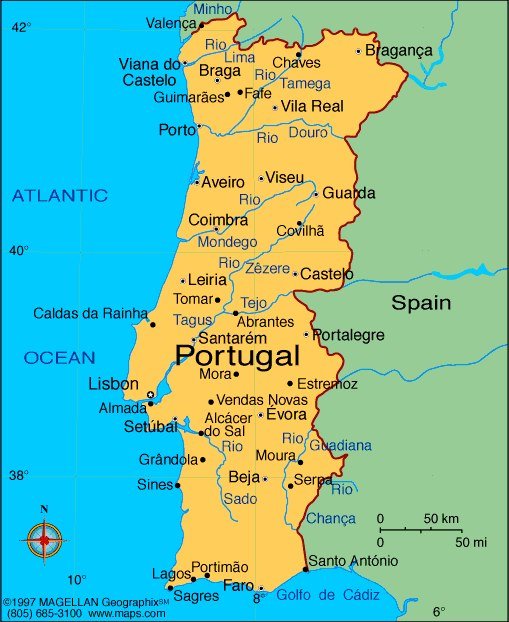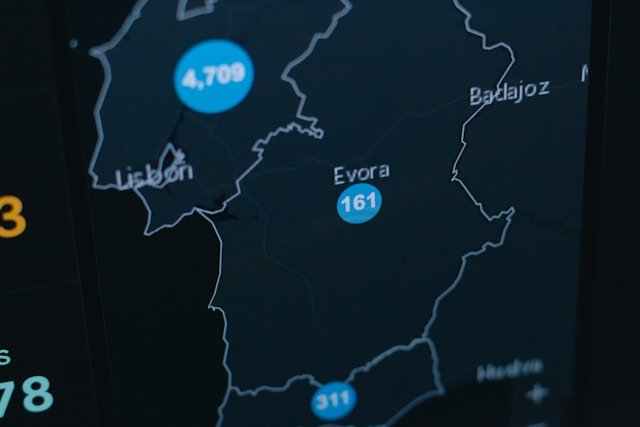Are You Planning to Move to Portugal? Best Cities to Live in Portugal That Are Not Lisbon – Part Two
Welcome to part two of the best cities to live in Portugal that are not Lisbon. If you want to read my previous blog about “Best Cities for Living,” you may go [link].
We started last time with Porto, and now we’ll continue with cities for beach lovers.
1. Cascais
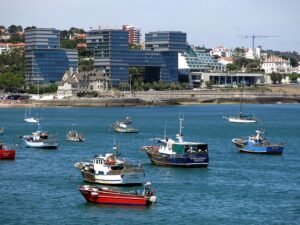
The first city I have here is Cascais. I’m pretty sure if you’ve done your research, you’ve heard that name a lot of times, simply because it is not far from Lisbon. The population of Cascais municipality is about 210,000 people, and if you are into beaches and want to be close to the water, Cascais is the city to live in.
However, Cascais can be more expensive due to its coastal location and popularity, though it will still be cheaper than Lisbon. One thing you need to know about Portugal is that it can be really humid and prone to mold during the winter, especially if you live next to the water. So, if you are okay with that, or if you want to live next to the water, choose a newer building or one that has been renovated to avoid mold issues in the winter. The closest airport would be Lisbon Airport, but there is also a train station in Cascais.
2. Ericeira
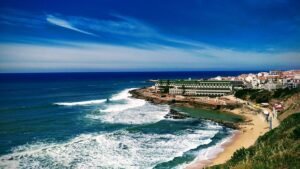
Moving on to the next city that offers a lot to my surfer friends, we have Ericeira. Ericeira is a small town with a population of about 10,000 people, and it is really charming and old. You can explore the cobblestone streets of the historic center, enjoy panoramic views from the cliffs, and of course, enjoy surfing because Ericeira is known for that. Ericeira is also known for its beaches. If you don’t want to surf, you can always enjoy some time near the ocean, get some sun, and just enjoy the weather. Ericeira is generally cheaper than Cascais or Lisbon. However, because of its popularity among surfers, prices can rise, especially during the big wave season or during competitions.
3. Almada

Moving on to the next city, which is Almada. Almada is a bigger city with 175,000 people. It is located right across from Lisbon, and many people choose it because it’s more affordable, though some areas, especially around Cristo Rei, are not so nice, so you need to be careful when choosing where to live in Almada. Almada is close to different beaches, such as Costa de Caparica, where many people from Lisbon go during the summer. The closest airport would be Lisbon Airport, and you have ferries and trains, so getting around is easy.
4. Lagos
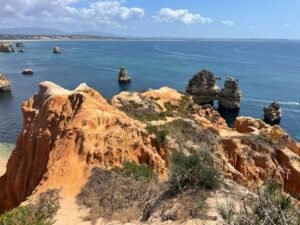
If you want to live in a warmer part of Portugal, you should definitely take a look at Lagos. There are around 30,000 people living in Lagos, which makes it a fairly small city. Lagos is known for its stunning beaches, so if you are a beach person and want to spend your days on the beach, Lagos is the place for you. Although Lagos is a popular tourist destination, prices are still more affordable, but keep in mind that Southern Portugal has a tourist season. If you move during that season and try to find accommodation, it might be more expensive. Lagos is a historic coastal town in the Algarve, known for its natural beauty, rich history, and vibrant cultural scene. The historic center is surrounded by walls and filled with traditional Portuguese architecture, charming squares, and a fairy-tale atmosphere.
5. Albufeira

Another city in the south of Portugal is Albufeira, with around 40,000 people living there. However, like Lagos, it sees lots of tourists during the season, so keep that in mind. Albufeira is famous for its beaches with golden sands and clear water, so if that’s what you’re looking for, Albufeira is a great option. The Algarve region has mild winters and hot summers, so if that appeals to you, Algarve is the place to be. The closest airport to Albufeira is Faro Airport, easily accessible by car or public transportation.
6. Viseu
And for my cold-weather lovers, the first city I recommend is Viseu. It’s a fairly large city with a population of 100,000 people. Compared to Lagos or Albufeira, it’s much bigger. You will need to drive to the beaches, so it’s not ideal if you want to be near the water. However, the cost of living is definitely lower compared to Porto. Viseu is a charming city surrounded by vineyards and rolling hills, with a mix of historic and modern elements.
7. Vila Nova de Gaia
In my previous blog, many people mentioned that I forgot Vila Nova de Gaia, but I didn’t. I saved it for part two! Vila Nova de Gaia is literally across from Porto, with a population of around 300,000 people, making it a larger city if you don’t want to live in smaller places. Vila Nova de Gaia is located on the south bank of the Douro River, and while it doesn’t have beaches, it offers stunning views of Porto’s riverside. The cost of living can vary depending on the neighborhood you pick. Some areas are more affordable, while others are similar to Porto because Porto influences their living expenses.
8. Aveiro
Another city to consider is Aveiro. Aveiro is truly something special. I’ve been to many cities in Portugal, but Aveiro stands out. Some people even call it the “Venice of Portugal.” You can take boat tours along the canal, visit the Aveiro Cathedral, and relax on the nearby Costa Nova beach. Living in Aveiro is more affordable compared to bigger cities, and the atmosphere is chill.
9. Covilhã
Another great city is Covilhã. The city has a rich history, and the university adds a lively and youthful atmosphere. Covilhã is known for its connection to the wool industry, and you can visit the Wool Museum. If you’re into hiking, the city is perfect because of its proximity to the Serra da Estrela mountains. If you want to see snow, January is the time to go! You might even find some skiing opportunities. Unfortunately, there are no beaches, but you can’t have both snow and ocean! Covilhã is located between Porto and Lisbon, so you can travel to either airport depending on the best flight options.
10. Guarda
Another mountain city to consider is Guarda. It is one of the highest cities in Portugal, so if you want to live in the mountains, this is the place. The city is known for its well-preserved medieval architecture and long history. Since the city is elevated, you can expect colder temperatures, and even snow in the winter. Guarda has a population of 42,000 people, so it’s a decent-sized city. The cost of living is lower compared to urban areas, making it an affordable option. If you appreciate a quiet lifestyle and want to be close to nature, Guarda is a nice place to live. It’s also a good spot for immersing yourself in Portuguese culture, where you’ll have to speak the language more often compared to cities like Lisbon or Porto, where English is more commonly spoken.
Conclusion
If you pick a smaller city, you’ll learn Portuguese in no time! And I think that’s it for today. If you’re moving to Portugal, I wish you all the best with your move, and hope everything goes smoothly. As always, I’ll see you next week. Bye!
